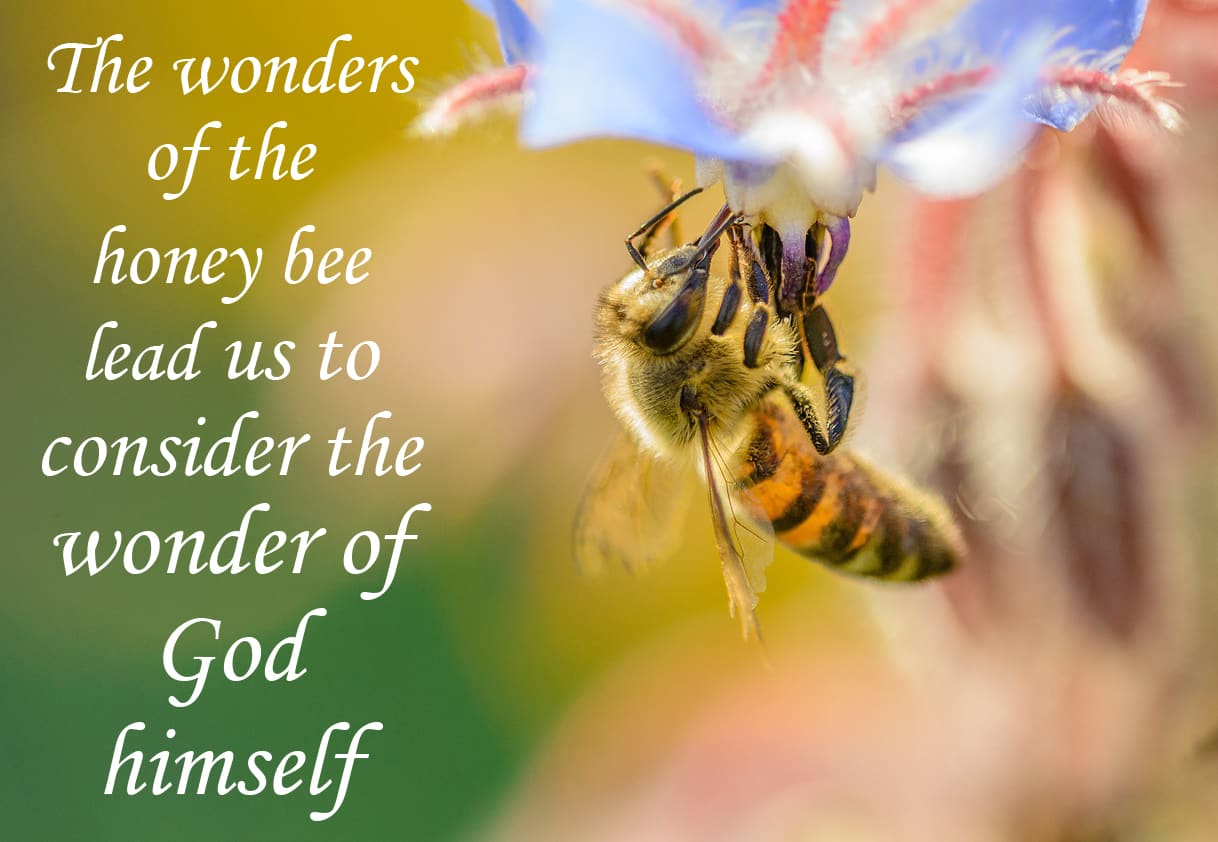
This got me thinking about the bees. Being rather partial to honey, I did a bit of research. Did you know the following facts?
A honey bee flaps its wings some twelve thousand times a minute. They are the only insects who produce food for human consumption; maintain a temperature of 33 degrees centigrade in their hives, even if it is minus 33 degrees outside; and communicate with each other by dancing.
There are references to honey in the Bible. The promised land of Canaan is described as ‘a land flowing with milk and honey’ (Exodus 3:4). Then, in the time of Samson, we read about a swarm of bees that had made their nest in the carcass of a lion. From this, Samson invented a riddle which went: ‘Out of the eater came something to eat. Out of the strong came something sweet’ (Judges 14:14).
Designed
But are there any spiritual lessons to be gleaned from bees and honey? Yes there are.
If we have the spiritual insight, when we consider how bees are designed and how a hive operates with queen bee and worker bees each knowing their specific role — along with the place of bees in the cycle of nature, in the pollination of plants — surely we have to stand in awe of God the great creator.
Does not an observation of the universe, both on the macro scale and micro scale, give evidence of intelligent design? How do we explain the stars? How do we explain the honey bee without bringing the almighty, all-wise God into the equation?
Divine creation is one of the main themes of the Bible. The message of the Bible can be summarised under headings of creation, man’s fall and redemption.
Its opening pages tell us, ‘In the beginning God created the heavens and the earth’, ‘and God said, let the earth bring forth living creatures according to their kind’ (Genesis 1:1,24).
The created order is the vehicle and theatre of God’s praise. As Mrs C. F. Alexander’s famous hymn puts it:
All things bright and beautiful,
All creatures great and small,
All things wise and wonderful,
The Lord God made them all.
Delectable
In the longest chapter of the Bible, Psalm 119, we read in verse 103, ‘How sweet are thy words to my taste, sweeter than honey to my mouth’.
The psalmist is surely describing every Christian’s testimony here. Christians have been given a spiritual taste — a love for God’s Word. Just as honey is energising and agreeable to the taste, so is the Bible, the written Word of the living God, to the believer.
It is the written revelation of the one, true God, and his plan of salvation to save a people for himself and his glory. It reveals the way in which condemned sinners can be eternally saved. Its message, in a nutshell, is that ‘God so loved the world that he gave his only Son that whoever believes in him should not perish but have eternal life’ (John 3:16).
There is, and there can be, no sweeter message than the saving grace and mercy of God to sinners, through Christ. ‘How sweet are thy words to my taste, sweeter than honey to my mouth!’
Disarmed
Finally, we note that bees possess a painful sting. No one wants a bee sting. One skin remedy for it, we are told, is to remove the barb left by the bee, and then, as the sting is acidic, neutralise it with a mild alkali, such as bicarbonate of soda.
In 1 Corinthians 15:56, Paul writes ‘the sting of death is sin’. Death and the afterlife would not be a problem for us if we did not have to stand before God as condemned sinners.
The problem is, though, that we are sinners and we will have to stand before God one day. ‘It is appointed for men to die once, and after that comes judgement’ (Hebrews 9:27).
But in 1 Corinthians 15:55 Paul is able to proclaim, ‘O death, where is thy sting?’ Every Christian is able to echo Paul’s triumphant exclamation here, for Jesus has taken the sting of death away for all who believe in him. Jesus has neutralised death’s horrific effects by dying in our place and taking the punishment for our sins which we deserved.
The gospel affirms, ‘Christ died for our sins in accordance with the Scriptures’ (1 Corinthians 15:3) and assures us, ‘There is therefore now no condemnation for those who are in Christ Jesus’ (Romans 8:1).
The wonders of the honey bee then lead us to consider the wonder of God himself. He is a creator of infinite wisdom. He has given us his precious and sweet Word. And in his Son he has provided a way — the only way — in which our sins can be forgiven and fellowship with God restored and assured, for time and eternity.
Timothy Cross



















